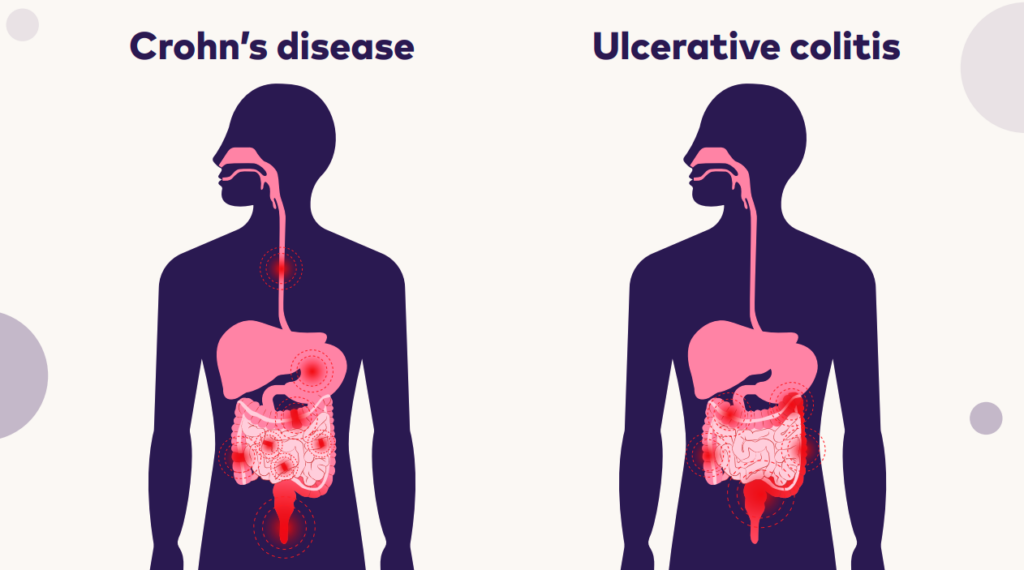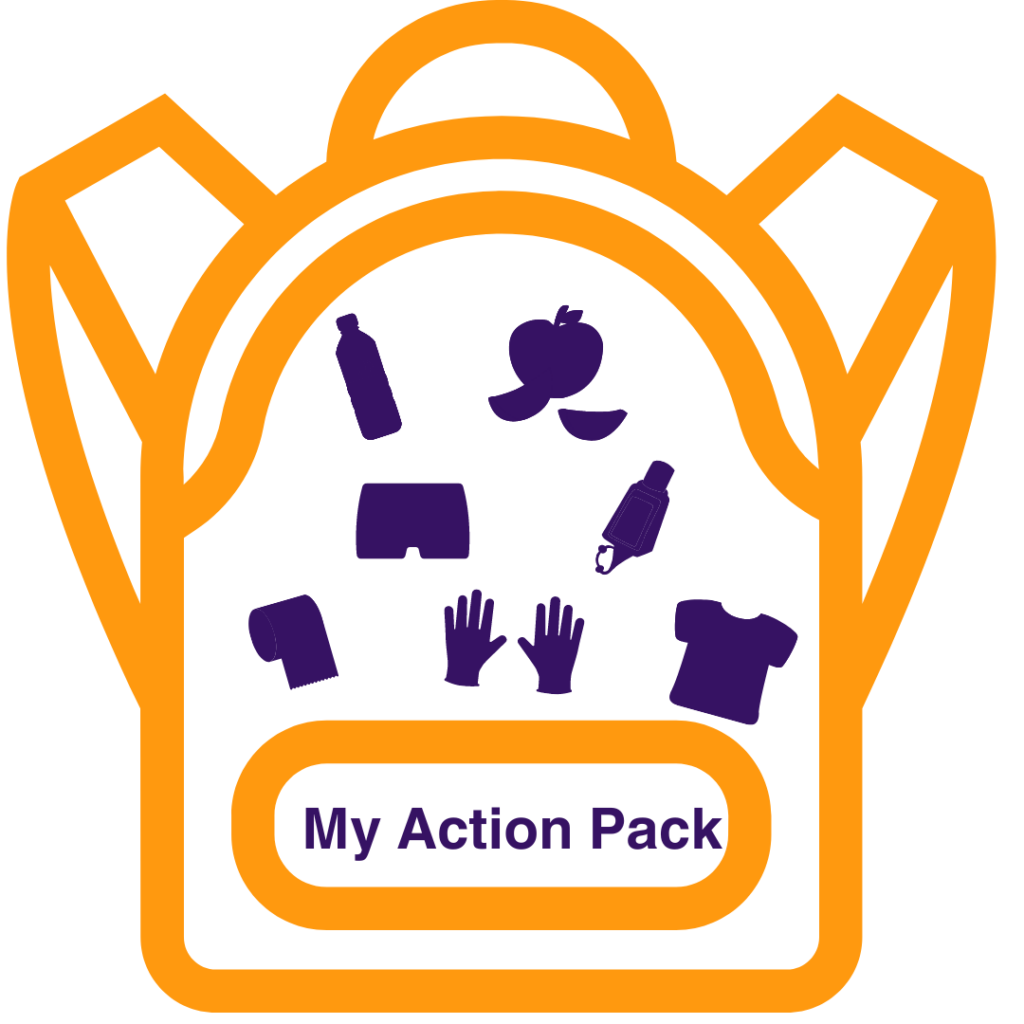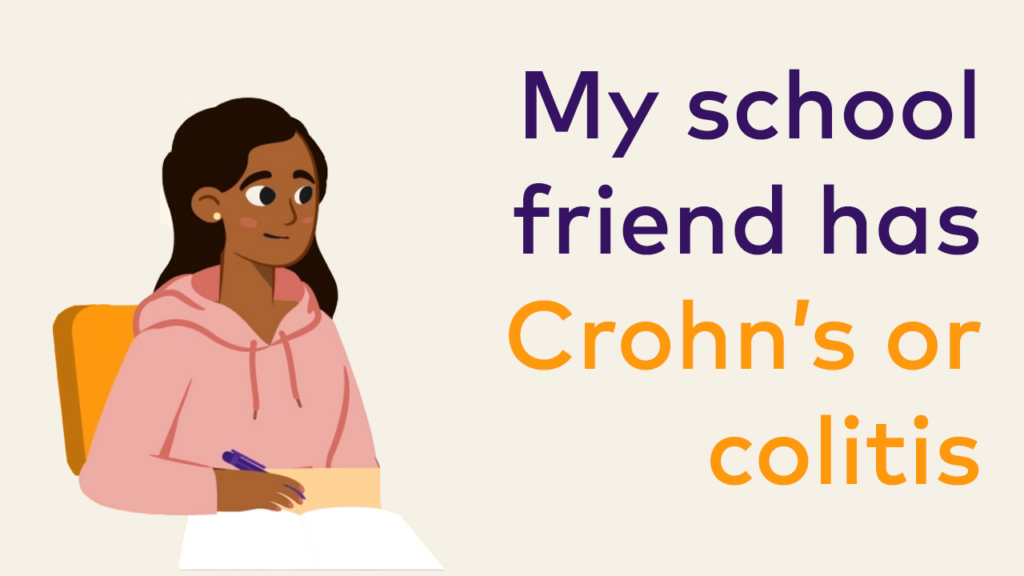Kids (under 12 years)
Understanding inflammatory bowel disease (Crohn’s disease and ulcerative colitis)
Key Points
- What causes inflammatory bowel disease (IBD) is a bit of a mystery!
- Crohn’s disease and ulcerative colitis are the two most common types of IBD.
- There’s no way to prevent or cure IBD right now, but it can usually be well managed.
- If you don’t feel well, tell someone you trust, such as a parent, carer or guardian.
Why is this happening to me?
What causes inflammatory bowel disease (IBD) is a bit of a mystery.
We know it can run in families, but we’re still trying to find out if IBD can be caused by what you eat, gut infections or even where you live.

You may have heard about Crohn’s disease or ulcerative colitis. These are the two most common types of IBD. Crohn’s disease happens when any part of your gastrointestinal system (gut) is affected, and colitis is when only your large intestine (the lower part of the tubes that carry your food from your stomach) are affected.

Sometimes you can have symptoms of both Crohn’s disease and ulcerative colitis and the condition is called IBD unclassified (IBDU).
Find more information about IBD Unclassified.
Can I stop it from happening?
There’s no way to prevent or cure IBD right now, but it can usually be well managed.
There are different types of medicines that can help stop things like diarrhoea and pain from IBD. Some medicines can help limit the number of times you get symptoms or how long they last, which can mean you are less likely to miss out on school or other activities.

You may also need to take things called nutritional supplements which help you grow and develop.
Find more information about nutrition.
When you are first diagnosed, it may take a little bit of time, even a few months, to figure out the right treatment for your IBD. Remember you have a condition like many people do, and the condition you have just needs to be managed so you can live a normal and healthy life.
Sometimes your symptoms may get worse for a while, known as a ‘flare up’. This can be treated with the help of your doctor.
More tests may be needed to help your doctors understand how IBD affects you over time.
Everyone experiences IBD differently and so everyone needs their own plan. Your doctor will help find the right plan for you, even if you are having a flare-up.
What can I do to avoid a flare-up?
The plan developed by your doctor aims to prevent flare-ups, but there are a few things that you can also do to help:
- Avoid foods that make you feel sick
- Eat healthy foods and have less processed foods like cakes, biscuits, chips and fried foods
- Take the medicines your doctor has chosen for you
- Avoid smoking
- Do the regular monitoring tests
- Go to all your appointments, and
- Let your parents or doctor know if you have any new symptoms or if you feel sick from your medication.

Talk to a dietitian if you would like to know more about diet and IBD.
What do I do when I don’t feel well?
If you don’t feel well, make sure you:
- Tell someone you trust, such as a parent, carer or guardian
- Go back and see your doctor, who might order some tests
- Take time to rest and recover – don’t be too hard on yourself!
IBD and growth
Key Points
- IBD can get in the way of how your body grows and changes
- Some IBD medications can affect your bones
- Talk to an adult you trust if you are worried

Crohn’s and colitis can affect how your body grows and changes. This can include things like your height, weight and how strong your bones are. For example, you may notice that you are shorter than some of your friends.
Being unwell with IBD may slow your growing down, but sooner or later you will catch up to your normal height when the disease is under control.
Some medications for IBD can make your bones a bit weaker than other people your age, which may mean you might be more likely to break a bone if you have an accident than some of your friends.
But there are a few things you can do to protect your bones:
- Make sure you are getting plenty of calcium – this includes eating foods like milk, cheese, yoghurt, almonds and leafy greens like bok choy and spinach (some of these foods may not agree with you but this is general advice)
- Make sure you’re getting plenty of vitamin D – which you can do by getting outdoors and playing safely in the sun (i.e. with a hat and sunscreen). Your doctor may also suggest taking a vitamin D supplement
- Take part in weight-bearing exercise – this includes things like walking, dancing or running. You could also get involved in a team sport like soccer or netball
- Speak to your doctor to learn more about healthy bones. Your doctor may recommend a type of scan of your bones called a bone density scan to check everything is ok.
Support
Key Points
- It can be hard when you feel like no one understands what you’re going through, even if they are trying their best.
- If you aren’t feeling OK, it’s important to speak up. Tell someone you trust, a doctor, or you can talk to us!
Who can I talk to about this?
Everyone deals with IBD in their own way. It can be hard when you feel like no one understands what you’re going through, even if they are trying their best.
When you have IBD you might feel sad at times or find it hard to feel calm. This is because your gut and your brain talk to each other. When one isn’t feeling well, this can affect the other.

If you aren’t feeling OK, it’s important to speak up. Talk to someone you trust, such as a parent, carer or guardian. They can make an appointment with your IBD service, or doctor. Your doctor can refer you to someone who can help you with how you are feeling.
Talk to us!
Crohn’s & Colitis Australia offers telephone support for kids with IBD. Call our IBD Helpline on 1800 138 029.
If you feel upset and want to speak with someone who isn’t a parent, carer or guardian, you can call Kids Helpline on 1800 55 1800
If it is an emergency call 000.
Things I might be worried about
Key Points
- You can plan ahead of time, so you know where the nearest bathroom is when you are out.
- It is important to know you are not alone. While everyone with IBD is different, many people have gone through similar things and may be able to help.
- IBD doesn’t mean you always have to miss out on important things!
- Even though you may miss school because of your IBD, you are still responsible for studying and completing schoolwork.
How do I find a toilet in an emergency?
Planning ahead of time so you know where the nearest bathroom is can help reduce any worries you may have about going out.

Crohn’s & Colitis Australia members with Crohn’s disease or ulcerative colitis, can also apply for a Can’t Wait card.
The card tells people that you may sometimes need urgent access to a bathroom.
Lots of places in Australia know about the Can’t Wait card and will help people who have one get to a bathroom in an emergency.
- Apply for a Can’t Wait card
- See a map of all public toilets in Australia or download the app
- Flush – Toilet Finder & Map app (worldwide)
How will others treat me?
There may be times when someone tells you things that don’t help or says something hurtful when they hear about your IBD. Most of the time they are trying to help, but they may not understand IBD or how their words may make you feel.

It is important to know you are not alone. While everyone with IBD is different, many people have gone through similar things and may be able to help.
Find people that want to understand you and let you share your feelings. This is called empathy. People with empathy can imagine what it’s like to walk in your shoes.
Remember good friends like you for who you are! You can find other kids with IBD through CCA’s youth programs.
Tips for talking to classmates about IBD
- Give friends the facts
- Ask for help when you need it
- Allow friends to ask questions
- If hurtful things are said let your teacher, parents or guardians know.
Learn more about communicating about my IBD.
FOMO (Fear of missing out)

Living with IBD can sometimes make people feel sad or worried, or that they are missing out on important things.
Pain, being uncomfortable or tired can make people feel limited in what they can and can’t do. Everyone experiences FOMO at times in their life, for different reasons.
IBD doesn’t mean you always have to miss out!
Here are some tips for overcoming FOMO:
- Make plans to do stuff when you usually feel best. If you tend to feel better in the morning, plan to do things earlier in the day. If you tend to get tired by Friday, try to do stuff earlier in the week. The key is to make plans for when you feel up to it and remember its ok if you have to cancel if you don’t feel well. Sometimes it can help if you tell people beforehand that you may get unwell without warning, and that you might need to cancel.
- Seize the moment when you’re feeling well and reach out to friends to do stuff.
- Be organised! A little planning can go a long way. Carry an action pack with things you might need quickly. This could include food, water, toilet paper, wet wipes, powder, hand sanitiser, air freshener, disposable gloves, freezer bags for clothes, clean underwear and other clothes. You can also ask mum or dad, or another helpful adult to call ahead to check on the bathroom situation.
- Have a back-up plan. This might include having mum or dad on standby to pick you up or plans for another place or time that’s more convenient for you.
- Join in online. If you’re not up to meeting your friends in person, then ask them to FaceTime you or send you Snaps.
- Talk to your doctor to see if there are things that can be done to help you feel more in control and comfortable making plans.
- Bring people to you. Arrange activities in places where you are most at home so that you feel more in control and comfortable.

What if my IBD gets in the way of school?

Even though you may miss school because of your IBD, you are still responsible for studying and completing schoolwork. This can be hard when you’re not feeling well, but there are some simple things you can do to keep on top of your work.
Some tips that may help you feel more comfortable at school:
- Have an ‘action pack’ in your school bag (see suggested items above)
- Create a private signal with your teacher to let them know you need to use the bathroom
- Many schools allow a toilet pass, so that you can leave class and go to the toilet without problems
- Many schools will give you access to extra toilets in the school
- Ask for a seat close to the door for when you need to leave to use the bathroom in a hurry
- Come up with a plan for getting notes if you miss a class or a test
- If you feel comfortable, talk to a trusted friend that can be a source of support during the day.
Learn more about IBD and school. We have a video on this page about how your school and friends can understand and help you.

Further information
Be careful what you read online and always refer to trusted sources of information like Government health websites or Crohn’s and Colitis Australia resources.
- Learn more about medication for IBD, treatment for Crohn’s disease , and ulcerative colitis.
- Learn more about Psychological Health & IBD.
- Learn more about IBD and school.
- Learn more about Communicating about my IBD.
- Learn more about Crohn’s and colitis for teens.